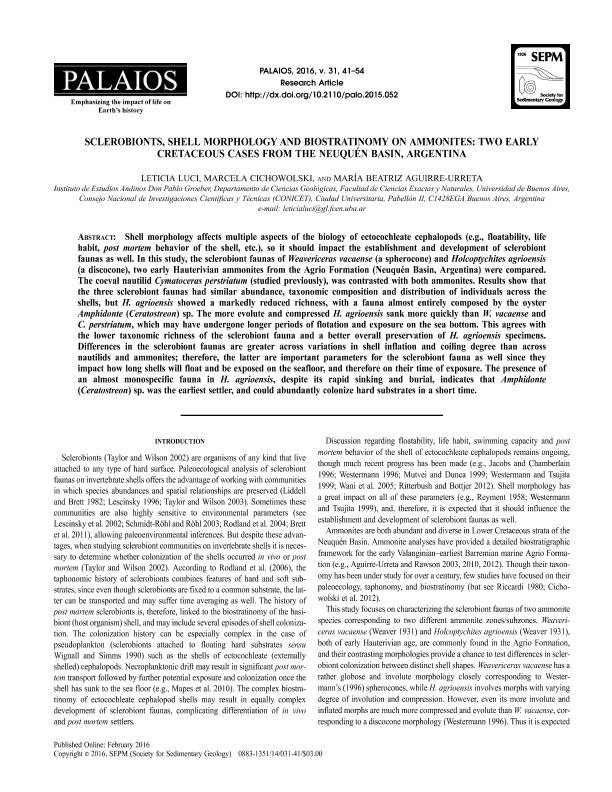Mostrar el registro sencillo del ítem
dc.contributor.author
Luci, Leticia

dc.contributor.author
Cichowolski, Marcela

dc.contributor.author
Aguirre-Urreta, Maria Beatriz

dc.date.available
2018-09-18T21:16:07Z
dc.date.issued
2016-02
dc.identifier.citation
Luci, Leticia; Cichowolski, Marcela; Aguirre-Urreta, Maria Beatriz; Sclerobionts, shell morphology and biostratinomy on ammonites: Two early cretaceous cases from the Neuquén basin, Argentina; Society for Sedimentary Geology; Palaios; 31; 2; 2-2016; 41-54
dc.identifier.issn
0883-1351
dc.identifier.uri
http://hdl.handle.net/11336/60166
dc.description.abstract
Shell morphology affects multiple aspects of the biology of ectocochleate cephalopods (e.g., floatability, life habit, post mortem behavior of the shell, etc.), so it should impact the establishment and development of sclerobiont faunas as well. In this study, the sclerobiont faunas of Weavericeras vacaense (a spherocone) and Holcoptychites agrioensis (a discocone), two early Hauterivian ammonites from the Agrio Formation (Neuquén Basin, Argentina) were compared. The coeval nautilid Cymatoceras perstriatum (studied previously), was contrasted with both ammonites. Results show that the three sclerobiont faunas had similar abundance, taxonomic composition and distribution of individuals across the shells, but H. agrioensis showed a markedly reduced richness, with a fauna almost entirely composed by the oyster Amphidonte (Ceratostreon) sp. The more evolute and compressed H. agrioensis sank more quickly than W. vacaense and C. perstriatum, which may have undergone longer periods of flotation and exposure on the sea bottom. This agrees with the lower taxonomic richness of the sclerobiont fauna and a better overall preservation of H. agrioensis specimens. Differences in the sclerobiont faunas are greater across variations in shell inflation and coiling degree than across nautilids and ammonites; therefore, the latter are important parameters for the sclerobiont fauna as well since they impact how long shells will float and be exposed on the seafloor, and therefore on their time of exposure. The presence of an almost monospecific fauna in H. agrioensis, despite its rapid sinking and burial, indicates that Amphidonte (Ceratostreon) sp. was the earliest settler, and could abundantly colonize hard substrates in a short time.
dc.format
application/pdf
dc.language.iso
eng
dc.publisher
Society for Sedimentary Geology

dc.rights
info:eu-repo/semantics/openAccess
dc.rights.uri
https://creativecommons.org/licenses/by-nc-sa/2.5/ar/
dc.subject
Hard Sustrate Fauna
dc.subject
Encrustation
dc.subject
Ammonite Taphonomy
dc.subject
Nekroplanctonic Drift
dc.subject.classification
Geociencias multidisciplinaria

dc.subject.classification
Ciencias de la Tierra y relacionadas con el Medio Ambiente

dc.subject.classification
CIENCIAS NATURALES Y EXACTAS

dc.title
Sclerobionts, shell morphology and biostratinomy on ammonites: Two early cretaceous cases from the Neuquén basin, Argentina
dc.type
info:eu-repo/semantics/article
dc.type
info:ar-repo/semantics/artículo
dc.type
info:eu-repo/semantics/publishedVersion
dc.date.updated
2018-09-18T13:17:36Z
dc.journal.volume
31
dc.journal.number
2
dc.journal.pagination
41-54
dc.journal.pais
Estados Unidos

dc.journal.ciudad
Lawrence
dc.description.fil
Fil: Luci, Leticia. Consejo Nacional de Investigaciones Científicas y Técnicas. Oficina de Coordinación Administrativa Ciudad Universitaria. Instituto de Estudios Andinos ; Argentina
dc.description.fil
Fil: Cichowolski, Marcela. Consejo Nacional de Investigaciones Científicas y Técnicas. Oficina de Coordinación Administrativa Ciudad Universitaria. Instituto de Estudios Andinos ; Argentina
dc.description.fil
Fil: Aguirre-Urreta, Maria Beatriz. Consejo Nacional de Investigaciones Científicas y Técnicas. Oficina de Coordinación Administrativa Ciudad Universitaria. Instituto de Estudios Andinos ; Argentina
dc.journal.title
Palaios

dc.relation.alternativeid
info:eu-repo/semantics/altIdentifier/doi/http://dx.doi.org/10.2110/palo.2015.052
dc.relation.alternativeid
info:eu-repo/semantics/altIdentifier/url/https://pubs.geoscienceworld.org/sepm/palaios/article/31/2/41/100168/SCLEROBIONTS-SHELL-MORPHOLOGY-AND-BIOSTRATINOMY-ON
Archivos asociados
